Saving
Grace
At
New Dominion School, at-risk kids work together to change their lives.
by
Sandy Hevener, Contributing Writer
|
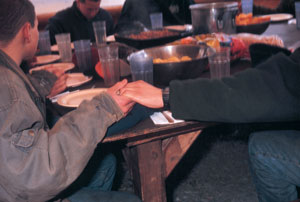
Panaka
members join hands in thanks before the meal they have prepared. |
At first glance you think, �Oh, another Outward
Bound-type school.� A couple of teenagers stack firewood while others
work to secure wooden poles that support canvas structures at a campsite.
A few campers inside one of the structures sit on logs, engrossed in a
discussion. They joke and ignore the eight inches of snow on the ground.
Yes, the kids at New Dominion School in Dillwyn live
in structures they must build for themselves in the woods, but the real
challenge they face is inward. They aim to tame out-of-control lives.
They�re the kids military schools send home � kids who make
self-destructive decisions that push them through cracks in traditional
educational systems and often land them in juvenile justice systems.
|
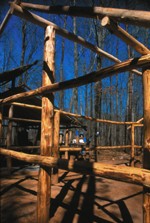
Youths
determine which structures need repair or rebuilding and set the
quality standard for the construction. Sometimes they tear things
down and start over several times before agreeing that it's the
best possible job. |
When they arrive at New Dominion, students don�t
attend formal classes. Many were skipping school and wouldn�t go anyway.
In a short time they are knocking on Principal Bill Hyson�s door with
portfolios in hand asking to enroll in English. Why? Projects to build and
maintain a group�s campsite engage problem-solving skills dependent on
math and language skills. When the kids recognize the need, they decide to
attend formal classes.
But, first they must earn the right to use a
pocketknife and lighter.
�It made me nervous when I asked for the knife,�
a 14-year-old reveals. He needs a pocketknife to cut twine and plastic
tarps they use to build the shelters. The lighter is necessary to start
fires in stoves for heat or cooking and to light lanterns at night. His
group, Panaka, decides when he or any member is trustworthy. Group leaders
who control the pocketknives and lighters assure that only members earning
the privilege can access them.
�I really want to go home to get to know my
parents, work on my relationship with my brother,� he says. He�s been
at New Dominion a few months and will earn that privilege along with his
�Crest� in the next several months. �It�s hard to get your
Crest,� he explains. �It takes a lot of respect.�
|
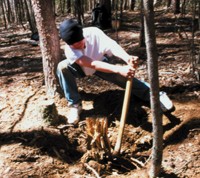
Group
members remove stumps left from trees cut for camp structures. |
Six groups of boys at one end of the 550-acre campus
and four girls� groups at the opposite end plan and judge the success of
their own day-to-day activities. Leaders share responsibilities with the
students and live with them 24 hours a day. If someone isn�t doing his
share or is causing others grief, a member is likely to call a group
meeting to confront the problem and get things back on track. Leaders risk
being the subject of such meetings as well as the students.
A Lesson in Commitment
After 27 years, Mack O�Connor, one of the
school�s three founders, is still there.
�Decisions are made by the majority,� he says.
�They discuss what they will do, agree who will do what and vote. For
example, they may decide they need to cut so much wood to stay warm and
the older guys will do 20 pieces, but a new guy with less experience and
younger will do only 10. If the new guy does five and says he�s not
doing any more, he can�t do anything else until he does the other five.
To get back with the group and do the fun things, he must do the final
five.�
That doesn�t mean groups make all their own
decisions, explains Program Director Josh Kepler. �In an emergency �
we are on a trail and it starts to lightning and we say �get off the
ridge�� the boys had better move. They want someone to take control
when they are afraid.�
|
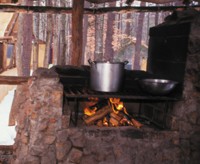
Panaka
members share in chores to prepare a lunch cooked over a fire. The
group does not only prepare their meals, they must design the menu
to meet nutritional standards and stay within a budget. |
Group meetings also address concerns the kids express
about their own situations.
At one such meeting several boys discuss upcoming
home visits. �Mom, she was drunk when I went home last time,� says one
boy wearing two toboggans. �She and Dad get to do whatever they want to
do, but I have to follow expectations.� Heads nod in agreement and he
receives encouragement to ignore the double standard and do the right
thing, even if his parents don�t.
As they enter another group meeting, a kid with a
Yankees toboggan pulled way down on his head says, �We had a struggle.
Tonight�s �night out,� but we won�t go. Didn�t earn it.�
While members of groups with names like Tawanka,
Currahee, Chatawba, Sulaho and Achunda go off campus and into town for the
evening, Panaka members anticipate staying home.
As the meeting starts, without prompting, different
boys mention things they did or didn�t do that they think will prevent
them from earning this week�s night out. Leaders Ben Rhem and Nicholas
Maldonado listen without commenting.
|
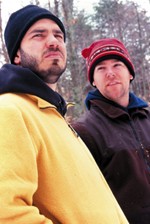
Leaders
such as Nicholas Maldonado and Ben Rhem "risk" or
subject themselves to the same constructive criticism that group
members exchange during group meetings. |
Finally Maldonado says, �I�m glad to hear you
saying this. I didn�t think you all were working on it at all. If we
aren�t doing what we need to do, we don�t even need an inspection. We
aren�t going to get a night out anyway.�
Then Senior Supervisor Carrie Shaffer enters and
reads from a list that includes �A sock under bed, snow on a tarp,
wrinkled blanket and a penny on the ground under a shelf. After you fix
it, you can come down and shower,� she says.
One of the more experienced boys and a new arrival go
into a sleeping tent containing four cots. The blanket on one isn�t
smooth and the younger boy shrugs his shoulders as if to say, �Let�s
not fix it.� The older boy glances at him and yanks the blanket off the
bed. End of discussion.
A Change of Heart
|
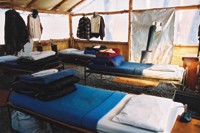
Groups
earn a "night out" in town when they pass a weekly
inspection, that includes personal areas like this, and meet goals
they set for themselves. |
The Yankees fan was not happy about being at New
Dominion when he came last fall. �I like it now,� he admits.
�Probably the most loved friends I have are here. I know they accept me
for who I am and I don�t worry about them making fun of me. Everybody
here struggles. At home I didn�t know my friends as well. I�ve changed
a little bit. I now realize you can�t get by without school. I used to
think you could.�
In November a boy with intense brown eyes mentions
that he is reading a 900-page book, The Mists of Avalon, by Marian
Bradley, a fantasy based on the King Arthur legend. He says he has trouble
writing. Is it a physical problem? �No. I�m impatient and can�t get
the thoughts down fast enough,� he confesses.
�Actually it only had 878 pages,� he says in the
spring. He�s proud of an after-school job he�s acquired and excited
about reading more books. �The job helps a lot with responsibility,�
he observes.
He recalls when he came to New Dominion 15 months
earlier. �I was angry at everything. It was a court-ordered thing. I
came for a tour, so sort of knew what to expect, but didn�t know what it
really would be like. It�s not bad once you get used to it.�
What did he do?
�I was sent here because I destroyed foster
homes,� he says. �Me and the foster parents couldn�t get along and I
was kicked out of four homes in less than a year.�
Looking for a Fresh Start
He looks forward to a fresh start in a new foster
home and running in a 10-kilometer race in Farmville. �Two of us ran in
it last year and I wanted to be one of them,� he says. �They asked me
this year.�
By spring, the 14-year-old boy is 15 and barely
remembers that his mother missed her first visit last fall. �The winter
was hard, but it felt good,� he remarks. He beams while telling how the
Panaka group finally got the frame for a new eating tent right. They had
torn it down and rebuilt it three times before they were satisfied.
What about competitions at the school?
�Competition makes others insecure and that
doesn�t feel good,� he answers. �Working together makes everyone
feel good.�
Lesson learned.
What�s the Plan?
New Dominion School replaces
modern distractions with a natural environment that promotes emotional
health. Programs cater to adolescents struggling with rebellious or
deceptive behavior, emotional challenges, delinquency and substance abuse.
The program follows concepts
developed by Campbell Loughmiller at a Texas boys� camp established in
1946. His book, Wilderness Road (1965, Library of Congress 65-20580),
details the therapeutic benefits of camping.
In 1976 Melvin Klement, Mack
O�Connor and Richard Warren founded the school for boys in Dillwyn, Va.
In 1981 they opened a second campus in Old Town, Md., and added a separate
girls� program in Dillwyn in 1996. In 1994 Three Springs Outdoor
Therapeutic Programs acquired the schools, which retain their original
agenda.
Students can earn a credited
high school diploma or a G.E.D. through individual instruction provided by
certified teachers. Besides classrooms, academic buildings contain a
library, computers and a movie/conference room. The ultimate goal is for
students to return home as successful family members.
Most students participate in
adventure-based activities in addition to the on-campus programs. Groups
research possible hikes, canoe trips or caving adventures, agree on one
and plan ahead for the day-to-day activities that may put them on the road
for a week or two.
Three staff members oversee
each group of 10 to 12 students. All have at least a bachelor�s degree
and one or more are with every student at all times.
Families of students receive staff support and participate in
counseling sessions. A consulting psychologist comes to the campus.
Staff Silhouettes
�If a boy yells � and they
do yell � the point is he needs to be heard � A
lot of the kids here don�t get listened to at home.�
�There�s no Prozac here.�
(The school requests that new students� doctors wean them off
mind-altering medicines.)
�I could do this job without
getting dirty, but that would diminish my authority.�
�My best friends are here.�
Josh Kepler, Program Director
�School
is a privilege. They must make a request to attend. They submit a plan and
present a portfolio.�
�We
can ask them to go back to the group or they can ask to go back.
They
are not here to deal with group problems and must leave them outside the
school.� Bill Hyson, Principal
�It�s
easy to talk about music, surface things. Real things are a lot harder.�
�They
can be themselves here. If angry, it�s okay to say �I am angry.� If
they want to cry, they don�t have to be tough or cool. They are
accepted.� Nicholas Maldonado, Group Leader
�Here
there is no place to hide, no buffer. The kids point it out if someone�s
not helping. They say he�s holding up the whole group and call a group
meeting.�
�We
take the kids that other schools kick out � boarding schools, military
schools. We can�t cure or work with every kid, but it�s a hard
decision not to accept one.�
Ben
Montano, Program Administrator
Want
to Know More?
Log
on to www.threesprings.com or www.ndsvirginia.com or contact:
New
Dominion School (boys)
P.O.
Box 540
Dillwyn,
VA 23936
(434)
983-2051
New
Dominion Girls Program
P.O.
Box 876
Dillwyn,
VA 23936
(434)
983-2811
New
Dominion School (boys)
20700
Wagner Cutoff Rd.
Old
Town, MD 21555
(888)
841-4421